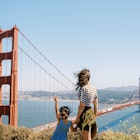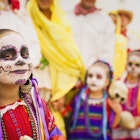

The Haight Ashbury intersection street sign in San Francisco
It’s 50 years since peace, love and psychedelia burst out from the San Francisco underground into the mainstream, heralding 1967’s Summer of Love.
So pop The Grateful Dead on your headphones, throw your arms into your finest floral shirt and make for these must-see sights in the one-time heartland of the hippies.
- placement: fullWidth
- path: articles/in-content-top
- possible size: [970, 250], [970, 90], [728, 90], [300, 250], [320, 50], [1, 1],
- targeting:
{ "url": "san-franciscos-summer-of-love-revisited" }

Beat Museum
To understand how the hippies took over San Francisco, you need to go back to the 1950s and explore that other Californian cultural phenomenon, the Beats. The Beat Museum in North Beach is home to hundreds of original artifacts, including notebooks and photos from Jack Kerouac’s pioneering journeys across America that led to his seminal On The Road, a huge influence on the teenagers who would pioneer the hippie movement and be at the forefront of the Summer of Love.
It also looks at the influence of poet Allen Ginsberg, who linked the Beats and the hippies through his work and activism. The museum retains a chilled vibe very much in keeping with 1967, with old hippies selling tickets and sharing tales of the good old days.

City Lights
City Lights was and is a totem of San Francisco’s countercultural movement. Founded by Beat poet Lawrence Ferlinghetti, its left field selections and readings by local authors made it the intellectual heart of the Summer of Love. That hasn't changed, either. Over the sixty seven years that City Lights has been in business, it's become so integral to the fabric of San Francisco that when the COVID-19 pandemic threatened to close it for good, hundreds of donors raised nearly half a million dollars on GoFundMe to keep the staff paid and bills paid until shoppers could return. Talk about love.
City Lights' street corner location on Columbus Avenue, a stone’s throw from the Beat Museum, is impossible to miss. Pop in and you’ll find shelves stacked with everything from surrealist treatises to green politics, a true reflection of the academic side of the hippie dream. And if all that seems a bit too heavy, you can always browse the fiction section and pick up a branded tote bag instead.

Haight and Ashbury
The intersection at Haight and Ashbury was the epicenter of the hippie movement that began in San Francisco in 1964 and reached its peak in 1967. Known simply as The Haight, the area was home to some of scene’s biggest names, from Jefferson Airplane to Janis Joplin, as well as the first ‘head’ shop – whose merchandise helped booming numbers of visiting teenagers to ‘turn on, tune in and drop out’.
- placement: fullWidth
- path: articles/in-content-middle
- possible size: [970, 250], [970, 90], [728, 90], [300, 250], [320, 50], [1, 1],
- targeting:
{ "url": "san-franciscos-summer-of-love-revisited" }
Today, having emerged from years as a seedy district, The Haight trades on its hippie past with vintage clothes stores, bars and brunch spots. Music fans should head to 710 Ashbury to see where The Grateful Dead lived at the height of their fame before strolling down Haight towards Golden Gate Park to pick up classic records from the period at the cavernous Ameoba Music.
Depending on when you time your visit, you might catch the annual Haight-Ashbury Street Fair, launched in 1978, which typically takes place each June. At the other end of summer is the annual Jerry Day concert in honor of Grateful Dead frontman Jerry Garcia, which is hosted in McLaren Park.

Golden Gate Park
Speaking of Golden Gate Park, San Francisco’s vast back yard was the go-to spot for the hordes piling into the city as 1967 got underway. The park’s Polo Fields were the site of The Human Be-In in January 1967, with as many as 30,000 young people gathering to see hippie pioneer Timothy Leary urge them to ‘drop out’ as Big Brother and the Holding Company play their brand of bluesy psychedelic rock. Today it’s seen as a defining counterculture event which officially kicked off the Summer of Love.
Things in Golden Gate Park are a touch more sedate now, with runners, walkers and cyclists outnumbering hippies. Take a stroll here on a sunny day with some vintage psych on your iPod, though, and you can still feel the vibes.

The Fillmore Auditorium
The tripped-out tracks of 1967 define the Summer of Love to this day. And no venue was as important to this burgeoning scene as the Fillmore Auditorium. The focal point of the San Francisco music boom, the world’s hottest bands helped turn the Fillmore into the coolest auditorium in the world. You hadn’t made it until you took to the stage there. Jimi Hendrix, The Byrds, The Doors and Pink Floyd all rocked out during that heady summer.
- placement: native
- path: articles/in-content-native
- possible size: [f, l],
- targeting:
{ "url": "san-franciscos-summer-of-love-revisited" }
After falling into disrepair in the 1980s, the Fillmore, found in the district of the same name, is once again one of the city’s best places to see live music. Check out their official website to see what bands are playing and lose yourself in the tunes.

Make like the Merry Pranksters on a hippie bus tour
The Summer of Love might never have happened were it not for author Ken Kesey and his Merry Pranksters, a band of early hippies who rode a colorfully painted bus from San Francisco across the United States.
While you might not have time for a cross-continental jaunt, San Francisco Love Tours offers rides in a converted 1970s VW Camper Van, replete with beaded curtains, garish seats and a psychedelic paint job, taking in all the classic sights around the city. Magic Bus SF’s two-and-a-half-hour ride takes you on a trip back in time to 1967. Expect flowers, blissed out folk on the stereo and even an on-board light show.

How you can still experience the vibes
If you want to get on the fast track and are of age, book a cannabis tour and enjoy seeing San Francisco from a higher perspective with all the perks of visiting a non-prohibition state. Green Guides offers walking and bus tours through the city – the later of which pays a visit to the Haight. Or you can book with Emerald Farm Tours and blaze in a lit up party bus as you learn more about Cali cannabis.
Whether you wind up with the munchies or just fancy a good lunch, head to San Francisco's famous Chinatown, snag a table at Sam Wo, and order a bowl of noodles. Like City Lights, Sam Wo was inherited by the hippies from the beats, who liked to crowd into the city's oldest Chinese restaurant for a bite (when they weren't taking up the mezzanine at Vesuvio Cafe). Though it's at a different location now than it was in the 60's, it still attracts more than a few nostalgic faithfuls remembering their salad days.
Just across the Bay, incidentally, in Berkeley, California is a fantastic restaurant owned by John Paluska, the former manager of rock band Phish. Phish may have missed the Summer of Love by a few decades, but are certainly carrying on the Dead's tradition with their jammy, meandering riffs. Comal and its casual little sibling Comal Next Door offer fresh takes on Mexican cuisine. Order up the tofu chile verde from Comal Next Door in the spirit of the hippies.
Last but not least, be sure to pick up a good book like David Talbot's Season of the Witch from City Lights to learn more about the pivotal history of the Summer of Love, grab a picnic blanket, and head down to Golden Gate Park to put on your own Be-In, flipping pages and braiding clover.
- placement: fullWidth
- path: articles/bottom
- possible size: [970, 250], [970, 90], [728, 90], [300, 250], [320, 50], [1, 1],
- targeting:
{ "url": "san-franciscos-summer-of-love-revisited" }
Explore related stories





 Art and CultureA reason to travel to San Francisco this month: the new Institute of Contemporary Art
Art and CultureA reason to travel to San Francisco this month: the new Institute of Contemporary ArtOct 5, 2022 • 4 min read
 Art and Culture9 US cities that do Día de Muertos right and when to go in 2022
Art and Culture9 US cities that do Día de Muertos right and when to go in 2022Sep 28, 2022 • 7 min read

 ArtExplore the history of the nation: 10 most storied places in the US to visit in 2022
ArtExplore the history of the nation: 10 most storied places in the US to visit in 2022Jun 28, 2022 • 5 min read
 National ParksFinding Indigenous America in US national parks this summer 2022
National ParksFinding Indigenous America in US national parks this summer 2022Jun 14, 2022 • 8 min read
